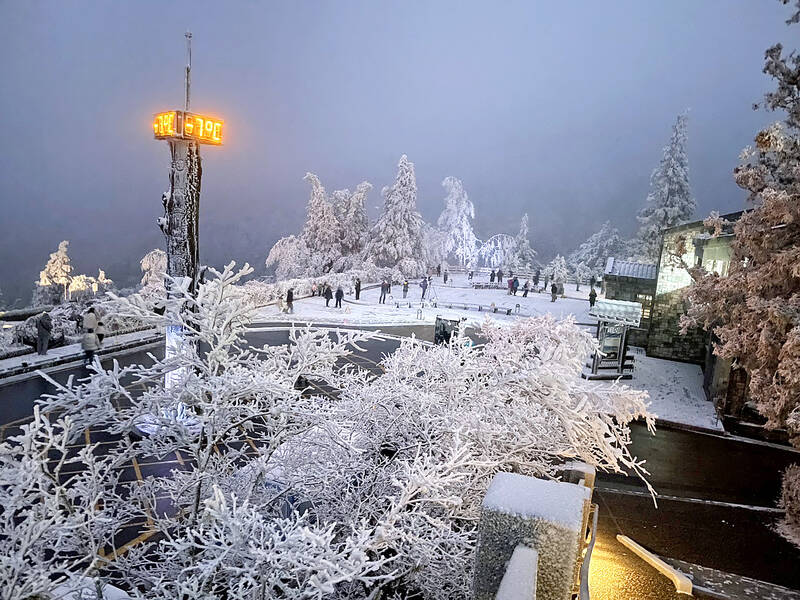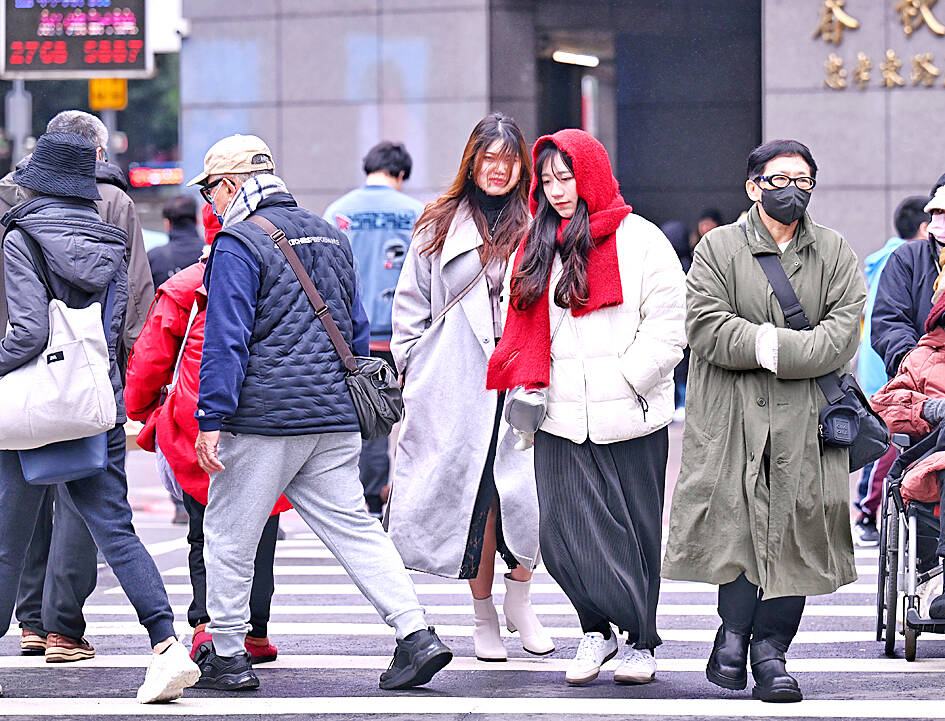A total of 415 cases of out-of-hospital cardiac arrest (OHCA) occurred this month as of Saturday, data from the National Fire Agency showed as doctors advised people to stay warm amid cold weather, particularly people with cardiovascular disease.
The Central Weather Administration yesterday issued a low temperature warning nationwide except for Penghu County, anticipating sustained lows of 10°C or a dip to below 6°C in Nantou, Yilan, Hualien and Taitung counties, as well as areas north of Yunlin County.
The coldest temperature recorded in flat areas of Taiwan proper yesterday morning was 6.4°C in New Taipei City’s Shiding District (石碇).

Photo courtesy of the Taipingshan National Forest Recreation Area
Sixty-three nontraumatic OHCA cases were reported on Feb. 1, the most for a single day this year, followed by 28, 52, 51, 61, 56, 50 and 54 for each day through Saturday respectively, National Fire Agency data showed.
Although the cases cannot be determined to be a result of cold weather, drastic changes in temperature can cause vasoconstriction, leading to conditions such as sudden stroke or acute myocardial infarction, which can induce OHCA.
Medical research shows that for every minute that cardiopulmonary resuscitation (CPR) is delayed in OHCA cases the success rate of emergency care is reduced by 7 to 10 percent, the agency wrote on Facebook.

Photo: Fang Pin-chao, Taipei Times
It urged people to download the agency’s First on Scene (急救先鋒) app to increase their capability of helping people with a heart attack.
As the 119 dispatch system is incorporated into the app, fire and rescue authorities can send an ambulance while informing and guiding nearby people who have downloaded the app to an OHCA incident occurring in a public place, the agency said.
They can help perform CPR or use an automated external defibrillator before paramedics arrive, increasing the odds of surviving a heart attack, it said.
The app also provides guidance on emergency care, which can assist people feeling unwell in deciding whether their conditions require medical attention, it said.
The Kaohsiung Department of Health also warned of the risk of cardiovascular incidents during cold weather, and cautioned that taking showers, getting up abruptly in the morning, going outside and changing clothes are the four high-risk moments for cardiovascular incidents to occur.
Blood vessels can suddenly contract while taking a shower in the cold due to drastic temperature changes, leading to unstable blood pressure or even heart attacks, it said.
People in a shower should wash themselves starting from their limbs instead of the head or chest, and warm up the bathroom ahead of time, it said.
As the lowest temperature usually occurs in the early morning, people can experience significant blood pressure fluctuations while getting up from bed due to higher blood viscosity and stronger vasoconstriction, it said.
Moving limbs to adapt to the cold in the morning before slowly getting up would help, it said, adding that it is also important to stay warm.
People moving from the warm indoors to the cold outdoors are advised to wear more layers, and cover their head, neck and limbs, as drastic temperature changes can lead to sudden vasoconstriction and increased blood pressure, the department said.
As sudden exposure to cold air can also cause drastic vasoconstriction and raise the risk of cardiovascular incidents, people should change their clothing when entering warm indoor environments, it said.
Elderly people and people with cardiovascular diseases or chronic diseases such as three highs — high blood pressure, sugar and cholesterol — are prone to cardiovascular issues and should be more aware of temperature changes in cold weather, it said.
They should keep warm, avoid strenuous exercise and drink water while outdoors, and continue to monitor their physical condition, it said.
If people experience the symptoms of a stroke or a myocardial infarction, such as chest tightness, chest pain, dizziness or numbness in limbs, they should go to a doctor right away for treatment within the “golden hour,” the department said.
Independent meteorologist Daniel Wu (吳德榮) said that the latest European Centre for Medium-Range Weather Forecasts model showed that northern Taiwan would remain chilly, while other areas would experience a significant day-night temperature difference from yesterday to today.
Temperatures on Taiwan proper could dip to 5°C, he said, adding that they would start to climb back up between this morning and Wednesday.
Additional reporting by CNA

SEPARATE: The MAC rebutted Beijing’s claim that Taiwan is China’s province, asserting that UN Resolution 2758 neither mentions Taiwan nor grants the PRC authority over it The “status quo” of democratic Taiwan and autocratic China not belonging to each other has long been recognized by the international community, the Mainland Affairs Council (MAC) said yesterday in its rebuttal of Beijing’s claim that Taiwan can only be represented in the UN as “Taiwan, Province of China.” Chinese Minister of Foreign Affairs Wang Yi (王毅) yesterday at a news conference of the third session at the 14th National People’s Congress said that Taiwan can only be referred to as “Taiwan, Province of China” at the UN. Taiwan is an inseparable part of Chinese territory, which is not only history but

CROSSED A LINE: While entertainers working in China have made pro-China statements before, this time it seriously affected the nation’s security and interests, a source said The Mainland Affairs Council (MAC) late on Saturday night condemned the comments of Taiwanese entertainers who reposted Chinese statements denigrating Taiwan’s sovereignty. The nation’s cross-strait affairs authority issued the statement after several Taiwanese entertainers, including Patty Hou (侯佩岑), Ouyang Nana (歐陽娜娜) and Michelle Chen (陳妍希), on Friday and Saturday shared on their respective Sina Weibo (微博) accounts a post by state broadcaster China Central Television. The post showed an image of a map of Taiwan along with the five stars of the Chinese flag, and the message: “Taiwan is never a country. It never was and never will be.” The post followed remarks

INVESTMENT WATCH: The US activity would not affect the firm’s investment in Taiwan, where 11 production lines would likely be completed this year, C.C. Wei said Investments by Taiwan Semiconductor Manufacturing Co (TSMC, 台積電) in the US should not be a cause for concern, but rather seen as the moment that the company and Taiwan stepped into the global spotlight, President William Lai (賴清德) told a news conference at the Presidential Office in Taipei yesterday alongside TSMC chairman and chief executive officer C.C. Wei (魏哲家). Wei and US President Donald Trump in Washington on Monday announced plans to invest US$100 billion in the US to build three advanced foundries, two packaging plants, and a research and development center, after Trump threatened to slap tariffs on chips made

CONSISTENT COMMITMENT: The American Institute in Taiwan director said that the US would expand investment and trade relationships to make both nations more prosperous The US would not abandon its commitment to Taiwan, and would make Taiwan safer, stronger and more prosperous, American Institute in Taiwan Director Raymond Greene said. “The US’ commitment to Taiwan has been consistent over many administrations and over many years, and we will not abandon our commitment to Taiwan, including our opposition to any attempt to use force or coercion to change Taiwan’s status,” he said in an exclusive interview with the Liberty Times (the sister newspaper of the Taipei Times) on Friday last week, which was published in the Chinese-language newspaper yesterday. The US would double down on its efforts